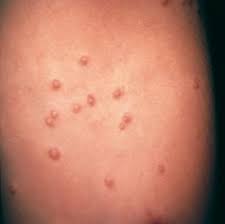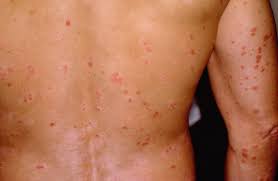Your skin is the largest organ in your body. It regulates the bodies temperature, and protects it from infections. Skin diseases can affect your appearance, causing embarrassment and low self esteem. Keeping your skin clean, moisturized, protected from the sun, not sharing towels, clothes, or blankets, removing damp clothing immediately, and covering open wounds can help prevent skin diseases.

Inflammatory Skin Diseases
Most of the more common skin diseases are classified as inflammatory skin diseases. Eczema, dermatitis, psoriasis, diaper rash and acne are all inflammatory skin diseases. Some of these skin diseases can last for extended periods of time. The symptoms these conditions cause are itching, redness, swelling, blisters, thickening skin, and skin lesions. Topical ointments are usually prescribed to lessen the itching and swelling. If the affected areas get infected, a doctor's visit will be required to treat the infection.

Viral Skin Diseases
Viral skin diseases are caused by viral infections. Viral skin diseases usually only last for a short period of time. Chicken pox, measles, herpes 1, herpes 2, and shingles are viral skin diseases. These are contagious and can be spread through personal contact. The symptoms that accompany these skin diseases are fever, blisters, rash, cold symptoms, and cold sores. Topical and prescription medications are available for viral skin diseases. There are vaccines available for measles and chicken pox.

Fungal Skin Diseases
Microscopic fungi are the cause of fungal infections. The fungi live om the bodies dead skin cells. Candida, athlete's foot and ringworm are all fungal infections. Symptoms of fungal infections are itching, raised areas of skin, redness, and burning. Fungal infections may reproduce rapidly if they are not treated. If you have a fungal infection, you will need to wash all bed linens, towels, and clothes regularly. Treatments can include oral medications, topical ointments, powders, and oral antiseptics.

Bacterial Skin Diseases
Staph is the most common cause of bacterial skin diseases. The bacteria enters the body through small cuts or any breaks in the skin. Impetigo, cellulitis, MRSA, folliculitis, scabies, and necrotizing fasciitis.are all bacterial skin diseases. Symptoms for bacterial skin diseases are pimples, boils, rashes, thirst, flu symptoms, lesions, fever, and low blood pressure. Treatment may involve antibiotics, draining the area, or in extreme cases, removing the infected area.

Cancerous Skin Diseases
Excessive exposure to the sun or tanning beds can cause skin cancer. Basil cell cancer, squamous cell cancer, and melanoma are types of cancerous skin diseases. Skin lesions or moles that change shape or color are signs of skin cancer and should be checked by a doctor. Cancerous skin diseases can be prevented by using sunscreen, lip balm with sun protection, and avoiding the use of tanning beds.
Inflammatory Skin Diseases
Most of the more common skin diseases are classified as inflammatory skin diseases. Eczema, dermatitis, psoriasis, diaper rash and acne are all inflammatory skin diseases. Some of these skin diseases can last for extended periods of time. The symptoms these conditions cause are itching, redness, swelling, blisters, thickening skin, and skin lesions. Topical ointments are usually prescribed to lessen the itching and swelling. If the affected areas get infected, a doctor's visit will be required to treat the infection.
Viral Skin Diseases
Viral skin diseases are caused by viral infections. Viral skin diseases usually only last for a short period of time. Chicken pox, measles, herpes 1, herpes 2, and shingles are viral skin diseases. These are contagious and can be spread through personal contact. The symptoms that accompany these skin diseases are fever, blisters, rash, cold symptoms, and cold sores. Topical and prescription medications are available for viral skin diseases. There are vaccines available for measles and chicken pox.
Fungal Skin Diseases
Microscopic fungi are the cause of fungal infections. The fungi live om the bodies dead skin cells. Candida, athlete's foot and ringworm are all fungal infections. Symptoms of fungal infections are itching, raised areas of skin, redness, and burning. Fungal infections may reproduce rapidly if they are not treated. If you have a fungal infection, you will need to wash all bed linens, towels, and clothes regularly. Treatments can include oral medications, topical ointments, powders, and oral antiseptics.
Bacterial Skin Diseases
Staph is the most common cause of bacterial skin diseases. The bacteria enters the body through small cuts or any breaks in the skin. Impetigo, cellulitis, MRSA, folliculitis, scabies, and necrotizing fasciitis.are all bacterial skin diseases. Symptoms for bacterial skin diseases are pimples, boils, rashes, thirst, flu symptoms, lesions, fever, and low blood pressure. Treatment may involve antibiotics, draining the area, or in extreme cases, removing the infected area.
Cancerous Skin Diseases
Excessive exposure to the sun or tanning beds can cause skin cancer. Basil cell cancer, squamous cell cancer, and melanoma are types of cancerous skin diseases. Skin lesions or moles that change shape or color are signs of skin cancer and should be checked by a doctor. Cancerous skin diseases can be prevented by using sunscreen, lip balm with sun protection, and avoiding the use of tanning beds.
Source - yahoo voice


